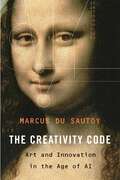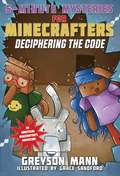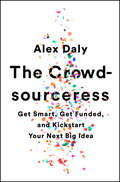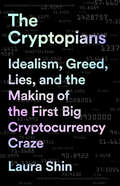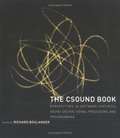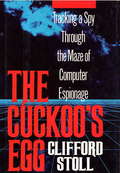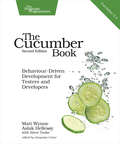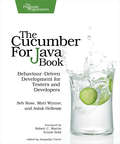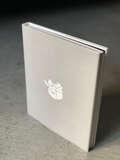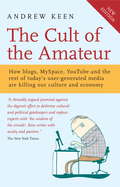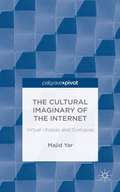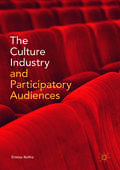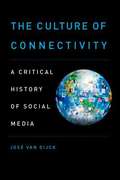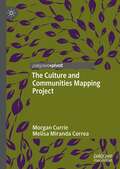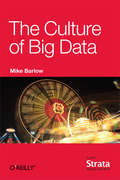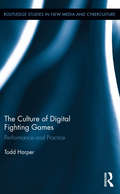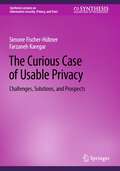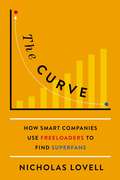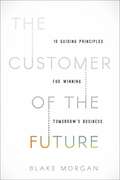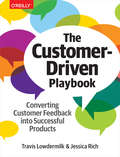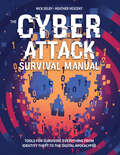- Table View
- List View
The Creativity Code: Art and Innovation in the Age of AI
by Marcus du SautoyMost books on AI focus on the future of work. But now that algorithms can learn and adapt, does the future of creativity also belong to well-programmed machines? To answer this question, Marcus du Sautoy takes us to the forefront of creative new technologies and offers a more positive and unexpected vision of our future cohabitation with machines.
The Creeper Attack: An Unofficial Minecrafters Time Travel Adventure (Unofficial Minecrafters Time Travel #2)
by Winter MorganAfter returning home from their travels through time, Brett just wants to return to his everyday life. He and his friend Poppy have been invited to build a new farm in the cold biome, and Brett begins to prepare. But as he gathers crops, he falls down the portal, and this time it carries him to the future! With nowhere else to turn, Brett travel to the future Meadow Mews, only to find it under daily attacks from creepers. He sees his friends—and his future self—living in constant fear. He wants nothing more than to help, but how can he explain his who he is? Worst of all, what happens when his friend assume he is a villain who stole their friend’s skin? Join Brett as he struggles to find a way to save his village in the second installment of the Unofficial Minecrafters Time Travel Adventure series from bestselling author Winter Morgan!
The Creeper Code: 5-Minute Mysteries for Minecrafters (5-Minute Stories for Minecrafters #2)
by Grace Sandford Greyson MannCreepers abound in Birchtown. So do mysteries! Like, who destroyed the village garden? What’s that strange music coming from the cobblestone well? And who—or what—keeps blowing up the blacksmith shop? Oliver and Audrey investigate in 5-Minute Mysteries for Minecrafters, an all-new series of stories for Minecrafters that can be read in five minutes! In The Creeper Code, the very first book in this mystery series, Oliver and Audrey learn there’s a reward for tracking creepers and cracking cases. From secrets in the swamp to bungles in the jungle, there are mysterious happenings in every block of the biome. But with Oliver’s eye for detail, Audrey’s courage, and their wolf-dog’s super-sniffing nose, no case is too tough for these twins to crack. Follow twins Oliver and Audrey as they solve mini mysteries in Birchtown—and all around the Overworld in The Creeper Code. In between mini mysteries are coded messages for you to decipher. You can solve each mystery, too—by searching for clues hidden in the stories and illustrations! Help decipher messages written in the “creeper code.” Hunt for clues and try to solve each mystery before Audrey and Oliver do!
The Crossing of Heaven
by Karl Gustafson Ioannis AntoniouAmong the group of physics honors students huddled in 1957 on a Colorado mountain watching Sputnik bisect the heavens, one young scientist was destined, three short years later, to become a key player in America's own top-secret spy satellite program. One of our era's most prolific mathematicians, Karl Gustafson was given just two weeks to write the first US spy satellite's software. The project would fundamentally alter America's Cold War strategy, and this autobiographical account of a remarkable academic life spent in the top flight tells this fascinating inside story for the first time. Gustafson takes you from his early pioneering work in computing, through fascinating encounters with Nobel laureates and Fields medalists, to his current observations on mathematics, science and life. He tells of brushes with death, being struck by lightning, and the beautiful women who have been a part of his journey.
The Crowdsourceress: Get Smart, Get Funded, and Kickstart Your Next Big Idea
by Alex Daly"Neil Young's Pono campaign was the third most successful hardware campaign of all time, and Alex deserves much of the credit, second only to Neil, of course. The Crowdsourceress will give you everything you need to make your campaign a success." --Phil Baker, COO, Pono"Owning The Crowdsourceress is like having Alex Daly's 'special sauce' right at your fingertips."--Jesse Reed, cofounder, Standards Manual In recent years, the crowdfunding industry has generated several billions in funding. But the harsh reality is that around 60 percent of Kickstarter campaigns fail. Enter Alex Daly, a crowdfunding expert who has raised over $20 million for her clients' campaigns. She has run some of Kickstarter's biggest projects-TLC's newest album, Neil Young's audio player, and Joan Didion's documentary. In this book, Daly takes readers deep inside her most successful campaigns, showing you how toGet fans and influencers excited about your launchBuild an appealing and powerfully designed campaignAccess proven video tips, pitching tactics, press releases, and rewards ideasAvoid the most common headaches and pitfallsHere you'll get tangible tools to run your own crowdfunding campaigns and fully connect with the crowd, get people to pay attention, and inspire them to act.
The Cryptopians: Idealism, Greed, Lies, and the Making of the First Big Cryptocurrency Craze
by Laura ShinThe story of the idealists, technologists, and opportunists fighting to bring cryptocurrency to the masses.In their short history, Bitcoin and other cryptocurrencies have gone through booms, busts, and internecine wars, recently reaching a market valuation of more than $2 trillion. The central promise of crypto endures—vast fortunes made from decentralized networks not controlled by any single entity and not yet regulated by many governments.The recent growth of crypto would have been all but impossible if not for a brilliant young man named Vitalik Buterin and his creation: Ethereum. In this book, Laura Shin takes readers inside the founding of this novel cryptocurrency network, which enabled users to launch their own new coins, thus creating a new crypto fever. She introduces readers to larger-than-life characters like Buterin, the Web3 wunderkind; his short-lived CEO, Charles Hoskinson; and Joe Lubin, a former Goldman Sachs VP who became one of crypto&’s most well-known billionaires. Sparks fly as these outsized personalities fight for their piece of a seemingly limitless new business opportunity.This fascinating book shows the crypto market for what it really is: a deeply personal struggle to influence the coming revolution in money, culture, and power.
The Csound Book: Perspectives in Software Synthesis, Sound Design, Signal Processing and Programming
by Richard BoulangerWritten by the world's leading educators, programmers, sound designers, and composers, this comprehensive guide covers both the basics of Csound and the theoretical and musical concepts necessary to use the program effectively.
The Cuckoo's Egg
by Clifford StollWhen computers exist hacker's coexist. Cliff Stoll found that his system was being used by someone else. It took a while for him to realize that there was a hacker behind it. So he decided to unwind the mystery by some undercover work.
The Cuckoo's Egg: Inside the World of Computer Espionage
by Clifford StollCliff Stoll was an astronomer turned systems manager at Lawrence Berkeley Lab when a 75-cent accounting error alerted him to the presence of an unauthorized users on his system. The hacker's code name was "Hunter"-- a mystery invader hiding inside a twisting electronic labyrinth, breaking into U. S. computer systems and stealing sensitive military and security information. Stoll began a one-man hunt of his own, spying on the spy-- and plunging into an incredible international probe that finally gained the attention of top U. S. counter-intelligence agents. "The Cuckoo's Egg is his wild and suspenseful true story-- a year of deception, broken codes, satellites, missile bases and the ultimate sting operation-- and how one ingenious American trapped a spy ring paid in cash and cocaine, and reporting to the KGB.
The Cucumber Book: Behaviour-Driven Development for Testers and Developers
by Matt Wynne Aslak Hellesoy Steve TookeYour customers want rock-solid, bug-free software that does exactly what they expect it to do. Yet they can't always articulate their ideas clearly enough for you to turn them into code. You need Cucumber: a testing, communication, and requirements tool-all rolled into one. All the code in this book is updated for Cucumber 2.4, Rails 5, and RSpec 3.5. Express your customers' wild ideas as a set of clear, executable specifications that everyone on the team can read. Feed those examples into Cucumber and let it guide your development. Build just the right code to keep your customers happy. You can use Cucumber to test almost any system or any platform. Get started by using the core features of Cucumber and working with Cucumber's Gherkin DSL to describe-in plain language-the behavior your customers want from the system. Then write Ruby code that interprets those plain-language specifications and checks them against your application. Next, consolidate the knowledge you've gained with a worked example, where you'll learn more advanced Cucumber techniques, test asynchronous systems, and test systems that use a database. Recipes highlight some of the most difficult and commonly seen situations the authors have helped teams solve. With these patterns and techniques, test Ajax-heavy web applications with Capybara and Selenium, REST web services, Ruby on Rails applications, command-line applications, legacy applications, and more. Written by the creator of Cucumber and the co-founders of Cucumber Ltd., this authoritative guide will give you and your team all the knowledge you need to start using Cucumber with confidence. What You Need: Windows, Mac OS X (with XCode) or Linux, Ruby 1.9.2 and upwards, Cucumber 2.4, Rails 5, and RSpec 3.5
The Cucumber for Java Book: Behaviour-Driven Development for Testers and Developers
by Matt Wynne Aslak Hellesoy Seb RoseTeams working on the JVM can now say goodbye forever to misunderstood requirements, tedious manual acceptance tests, and out-of-date documentation. Cucumber - the popular, open-source tool that helps teams communicate more effectively with their customers - now has a Java version, and our bestselling Cucumber Book has been updated to match. The Cucumber for Java Book has the same great advice about how to deliver rock-solid applications collaboratively, but with all code completely rewritten in Java. New chapters cover features unique to the Java version of Cucumber, and reflect insights from the Cucumber team since the original book was published.Until now it's been difficult for teams developing Java applications to learn how to benefit from Behaviour-Driven Development (BDD). This book changes all that by describing in detail how to use Cucumber to harness the power of plain language specifications in your development process.In part 1, you'll discover how to use Cucumber's Gherkin DSL to describe the behavior your customers want from the system. You'll also learn how to write Java code that interprets those plain language specifications and checks them against your application. Part 2 guides you through a worked example, using Spring, MySQL, and Jetty. Enhanced chapters teach you how to use Selenium to drive your application and handle asynchronous Ajax calls, and new chapters cover Dependency Injection (DI) and advanced techniques to help keep your test suites fast. Part 3 shows you how to integrate Cucumber with your Continuous Integration (CI) system, work with a REST web service, and even use BDD with legacy applications.Written by the creator of Cucumber and two of its most experienced users and contributors, The Cucumber for Java Book is an authoritative guide that will give you and your team all the knowledge you need to start using Cucumber with confidence.
The Cult of Mac, 2nd Edition
by Leander Kahney David PieriniIt's been nearly fifteen years since Apple fans raved over the first edition of the critically-acclaimed The Cult of Mac. This long-awaited second edition brings the reader into the world of Apple today while also filling in the missing history since the 2004 edition, including the creation of Apple brand loyalty, the introduction of the iPhone, and the death of Steve Jobs.Apple is a global luxury brand whose products range from mobile phones and tablets to streaming TVs and smart home speakers. Yet despite this dominance, a distinct subculture persists, which celebrates the ways in which Apple products seem to encourage self-expression, identity, and innovation.The beautifully designed second edition of The Cult of Mac takes you inside today's Apple fandom to explore how devotions--new and old--keep the fire burning. Join journalists Leander Kahney and David Pierini as they explore how enthusiastic fans line up for the latest product releases, and how artists pay tribute to Steve Jobs' legacy in sculpture and opera. Learn why some photographers and filmmakers have eschewed traditional gear in favor of iPhone cameras. Discover a community of collectors around the world who spend tens of thousands of dollars to buy, restore, and enshrine Apple artifacts, like the Newton MessagePad and Apple II.Whether you're an Apple fan or just a casual observer, this second edition of The Cult of Mac is sure to reveal more than a few surprises, offering an intimate look at some of the most dedicated members in the Apple community.
The Cult of the Amateur: How blogs, MySpace, YouTube and the rest of today's user-generated media are killing our culture and economy
by Andrew KeenA new, updated edition, with a new foreword of Andrew Keen's witty and provocative polemic against the rise of user-generated content and the anything goes standards of much online publishing, which set the blogosphere and media alight on publication. Dubbed the 'anti-christ' of Silicon Valley and a dot-com apostate Andrew Keen is the leading contemporary critic of the Internet. and The Cult of the Amateur is a scathing attack on the mad utopians of Web 2.0 and the wisdom of the crowd. Keen argues that much of the content filling up YouTube, MySpace, and blogs is just an endless digital forest of mediocrity which, unconstrained by professional standards or editorial filters, can alter public debate and manipulate public opinion.
The Cultural Imaginary of the Internet: Virtual Utopias and Dystopias
by Majid YarContemporary culture offer contradictory views of the internet and new media technologies, painting them in extremes of optimistic enthusiasm and pessimistic concern. This book explores such representations, uncovering the roots of our cultural responses to the internet, centred upon a profoundly ambivalent reaction to technological modernity.
The Cultural Logic of Computation
by David GolumbiaAdvocates of computers make sweeping claims for their inherently transformative power: new and different from previous technologies, they are sure to resolve many of our existing social problems, and perhaps even to cause a positive political revolution. In The Cultural Logic of Computation, David Golumbia, who worked as a software designer for more than ten years, confronts this orthodoxy, arguing instead that computers are cultural “all the way down”—that there is no part of the apparent technological transformation that is not shaped by historical and cultural processes, or that escapes existing cultural politics. From the perspective of transnational corporations and governments, computers benefit existing power much more fully than they provide means to distribute or contest it. Despite this, our thinking about computers has developed into a nearly invisible ideology Golumbia dubs “computationalism”—an ideology that informs our thinking not just about computers, but about economic and social trends as sweeping as globalization. Driven by a programmer’s knowledge of computers as well as by a deep engagement with contemporary literary and cultural studies and poststructuralist theory, The Cultural Logic of Computation provides a needed corrective to the uncritical enthusiasm for computers common today in many parts of our culture.
The Culture Industry and Participatory Audiences
by Emma KeltieThis project offers a new critique of participatory media practices. While the concept of participatory culture is often theorised as embodying the possibility of a potentially utopian future of media engagement and participation, this book argues that the culture industry, as it adapts and changes, provides moments of authorised participation that play out under the dominance of the industry. Through a critical recounting of the experience of creating a web series in Australia (with a global audience) outside of the culture industry structures, this book argues participation can take place. It is these platforms that become spaces of controlled access to participatory cultural practices.
The Culture Of Connectivity: A Critical History Of Social Media
by Jose Van DijckSocial media has come to deeply penetrate our lives: Facebook, YouTube, Twitter and many other platforms define many of our daily habits of communication and creative production. The Culture of Connectivity studies the rise of social media in the first decade of the twenty-first century up until 2012, providing both a historical and a critical analysis of the emergence of major platforms in the context of a rapidly changing ecosystem of connective media. Such history is needed to understand how these media have come to profoundly affect our experience of online sociality. The first stage of their development shows a fundamental shift. While most sites started out as amateur-driven community platforms, half a decade later they have turned into large corporations that do not just facilitate user connectedness, but have become global information and data mining companies extracting and exploiting user connectivity. Author and media scholar Jose van Dijck offers an analytical prism to examine techno-cultural as well as socio-economic aspects of this transformation. She dissects five major platforms: Facebook, Twitter, Flickr, YouTube, and Wikipedia. Each of these microsystems occupies a distinct position in the larger ecology of connective media, and yet, their underlying mechanisms for coding interfaces, steering users, and filtering content rely on shared ideological principles. At the level of management and organization, we can also observe striking similarities between these platforms' shifting ownership status, governance strategies, and business models. Reconstructing the premises on which these platforms are built, this study highlights how norms for online interaction and communication gradually changed. "Sharing," "friending," "liking," "following," "trending," and "favoriting" have come to denote online practices imbued with specific technological and economic meanings. This process of normalization, the author argues, is part of a larger political and ideological battle over information control in an online world where everything is bound to become social. Crossing lines of technological, historical, sociological, and cultural inquiry, The Culture of Connectivity will reshape the way we think about interpersonal connection in the digital age.
The Culture and Communities Mapping Project
by Morgan Currie Melisa Miranda CorreaThis book describes three years of work by the Culture and Communities Mapping Project, a research project based in Edinburgh that uses maps as an object of study and also a means to facilitate research. Taking a self-reflexive approach, the book draws on a variety of iterative mapping procedures and visual methodologies, from online virtual tours to photo elicitation, to capture the voices of inhabitants and their distinctive perspectives on the city. The book argues that practices of cultural mapping consist of a research field in and of itself, and it situates this work in relation to other areas of research and practice, including critical cartography, cultural geography, critical GIS, activist mapping and artist maps. The book also offers a range of practical approaches towards using print and web-based maps to give visibility to spaces traditionally left out of city representations but that are important to the local communities that use them. Throughout, the authors reflect critically on how, through the processes of mapping, we create knowledge about space, place, community and culture.
The Culture of Big Data
by Mike BarlowTechnology does not exist in a vacuum. In the same way that a plant needs water and nourishment to grow, technology needs people and process to thrive and succeed. Culture (i.e., people and process) is integral and critical to the success of any new technology deployment or implementation. Big data is not just a technology phenomenon. It has a cultural dimension. It's vitally important to remember that most people have not considered the immense difference between a world seen through the lens of a traditional relational database system and a world seen through the lens of a Hadoop Distributed File System.This paper broadly describes the cultural challenges that accompany efforts to create and sustain big data initiatives in an evolving world whose data management processes are rooted firmly in traditional data warehouse architectures.
The Culture of Digital Fighting Games: Performance and Practice (Routledge Studies in New Media and Cyberculture)
by Todd HarperThis book examines the complex network of influences that collide in the culture of digital fighting games. Players from all over the world engage in competitive combat with one another, forming communities in both real and virtual spaces, attending tournaments and battling online via internet-connected home game consoles. But what is the logic behind their shared playstyle and culture? What are the threads that tie them together, and how does this inform our understanding of competitive gaming, community, and identity? Informed by observations made at one of the biggest fighting game events in the world – the Evolution Series tournament, or "EVO" – and interviews with fighting game players themselves, this book covers everything from the influence of arcade spaces, to the place of gender and ethnicity in the community, to the clash of philosophies over how these games should be played in the first place. In the process, it establishes the role of technology, gameplay, and community in how these players define both themselves and the games that they play.
The Curious Case of Usable Privacy: Challenges, Solutions, and Prospects (Synthesis Lectures on Information Security, Privacy, and Trust)
by Simone Fischer-Hübner Farzaneh KaregarThis book journeys through the labyrinth of usable privacy, a place where the interplay of privacy and Human-Computer Interaction (HCI) reveals a myriad of challenges, solutions, and new possibilities. Establishing a solid understanding of usable privacy research, practices, and challenges, the book illuminates for readers the often shadowy corridors of such a multifaceted domain and offers guidelines and solutions to successfully traverse the challenging maze. The book does not simply focus on data protection or legislative frameworks but also on what it takes for privacy to be safeguarded, understood, embraced, and easily practiced by all. It begins with a thorough exploration of the background of privacy tools and technologies, the evolution of privacy rules and regulations, and the backdrop upon which this narrative unfolds. After establishing this context, its next important focus is the current state and future directions of the field, including thefrontiers of usable privacy research in relation to the Internet of Things (IoT), usability of PETs, and usable privacy for UX and software developers. The book also considers the often-overlooked privacy narratives of marginalized communities and delves into the complexities of user-centric privacy. Readers are provided with a blueprint for addressing these hurdles and establishing pathways for a more privacy-conscious world. The text will be of interest to students studying Computer Science, Information Systems, or Law, as well as researchers and practitioners working in the fields of usable privacy, privacy by design, Privacy-Enhancing Technologies (PETs), or HCI. All will benefit from the book’s central deliberation of a question that echoes through time and technological advancements: why does usable privacy matter?
The Curve
by Nicholas LovellIt's the ultimate business question of our time: How do real companies make money when customers expect (and often get) products for free? There are millions of potential customers in the world. Most of them won't pay anything for your product. But some will pay almost anything. The challenge is to find the latter without wasting time and money on the former. In The Curve, Nicholas Lovell weaves together stories from disparate industries to show how smart companies are solving this puzzle. From video games to pop music to model trains, the Internet helps businesses forge direct relationships with a vast global audience by building communities and offering bespoke products and experiences. In many cases, businesses can win by sharing their product (or a version of their product) for free, allowing it to spread as widely as possible. Eventually, a huge number of freeloaders spread the word to the superfans who value that product the most. And a small number of superfans will love a product so much that they will spend substantial sums of money on it--given the chance. These high-value customers are enough to fuel a profitable business. For example: Nine Inch Nails front man Trent Reznor gave away his album for free to find the 2,500 hardcore fans who wanted the $300 limited ultradeluxe edition. Bigpoint, an independent game developer, released three adventure games to 130 million users--and made 80 percent of its $80 million revenue from just 23,000 users, who spent money to upgrade their game-playing arsenal. King Arthur Flour shares useful recipes and tips on its Web site, enchanting a cult of devoted bakers, many of whom happily travel to its Vermont headquarters for expensive specialty baking classes. This approach doesn't apply just to digital products anymore. With the advent of 3D printing, customization of physical goods is easier and cheap, and companies can truly tailor their offerings to their customers. A doll company can personalize everything from hair color to eye shape, and automakers and technicians can create laser-scanned replacement parts for classic cars. Although the potential for piracy will spread to industries that believed they were immune to such disruption, businesses have an opportunity to make money in this new paradigm by offering variety, complexity, and flexibility at little to no extra cost. What Lovell calls the Curve is a ranking of your company's potential customers from those most likely to least likely to pay for your product or service. It charts their interest against the amount they are prepared to spend--be it nothing at all or thousands of dollars. The curve itself separates your revenue opportunity (willing big spenders, your superfans) on the left from your marketing opportunity (freeloaders, whose only acceptable price point is $0) on the right. The area under the curve is the total amount of money you might be able to get from your customers or fans. Lovell offers a strategy to draw more people into your orbit than was possible when physical costs limited your ability to expand. The Curve heralds a new era of creativity and business freedom.
The Customer of the Future: 10 Guiding Principles for Winning Tomorrow's Business
by Blake MorganTomorrow’s customers need to be targeted today!With emerging technology transforming customer expectations, it’s more important than ever to keep a laser focus on the experience companies provide their customers.In The Customer of the Future, customer experience futurist Blake Morgan outlines ten easy-to-follow customer experience guidelines that integrate emerging technologies with effective strategies to combat disconnected processes, silo mentalities, and a lack of buyer perspective.Tomorrow’s customers will insist on experiences that make their lives significantly easier and better. Companies will win their business not by just proclaiming that customer experience is a priority but by embedding a customer focus into every aspect of their operations. They’ll understand how emerging technologies like artificial intelligence (AI), automation, and analytics are changing the game and craft a strategy to integrate them into their products and processes.The Customer of the Future explains how today’s customers are already demanding frictionless, personalized, on-demand experiences from their products and services, and companies that don’t adapt to these new expectations won’t last. This book prepares your organization for these increasing demands by helping you do the following:Learn the ten defining strategies for a customer experience–focused company.Implement new techniques to shift the entire company from being product-focused to being customer-focused.Gain insights through case studies and examples on how the world’s most innovative companies are offering new and compelling customer experiences.Craft a leadership development and culture plan to create lasting change at your organization.
The Customer-Driven Playbook: Converting Customer Feedback into Successful Products
by Travis Lowdermilk Jessica RichDespite the wide acceptance of Lean approaches and customer-development strategies, many product teams still have difficulty putting these principles into meaningful action. That’s where The Customer-Driven Playbook comes in. This practical guide provides a complete end-to-end process that will help you understand customers, identify their problems, conceptualize new ideas, and create fantastic products they’ll love.To build successful products, you need to continually test your assumptions about your customers and the products you build. This book shows team leads, researchers, designers, and managers how to use the Hypothesis Progression Framework (HPF) to formulate, experiment with, and make sense of critical customer and product assumptions at every stage. With helpful tips, real-world examples, and complete guides, you’ll quickly learn how to turn Lean theory into action.Collect and formulate your assumptions into hypotheses that can be tested to unlock meaningful insightsConduct experiments to create a continual cadence of learningDerive patterns and meaning from the feedback you’ve collected from customersImprove your confidence when making strategic business and product decisionsTrack the progression of your assumptions, hypotheses, early ideas, concepts, and product features with step-by-step playbooksImprove customer satisfaction by creating a consistent feedback loop
The Cyber Attack Survival Manual: Tools for Surviving Everything from Identity Theft to the Digital Apocalypse (Survival Ser.)
by Nick Selby Heather VescentCybersecurity experts present an accessible, informative, and fully illustrated guide to protecting yourself, your assets, and your loved ones online. As we live more of our lives online, we need to be more aware of the risks we face—and what we can do to protect ourselves. We all know that our identities can be stolen, and that intellectual property can be copied and sold. But even scarier things are now possible. Vehicle systems can be hacked, our power grid can be sabotaged, and terrorists are getting more sophisticated by the day. In The Cyber Attack Survival Manual, you learn hands-on tips and techniques for fighting back. Author Nick Selby, a police detective who specializes in busting cybercriminals, gathers a consortium of experts in digital currency, crimeware, intelligence, and more in order to share the latest and best security techniques. The Cyber Attack Survival Manual covers: Everyday security: How to keep your identity from being stolen, protect your kids, protect your cards, and much more. Big Stories: Silk Road, Ashley Madison, FBI vs. Apple, WikiLeaks, Bitcoin, and what they mean to individuals and society at large. Global issues: the NSA, how hackers can crash your car, and looming threats from China and elsewhere.
